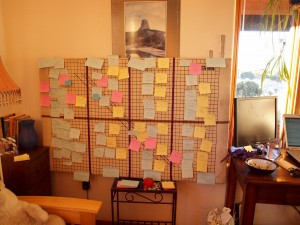 If you look closely, that thermometer reads 9.3 degrees F. Brr! But then the sun rose high enough, it warmed up, and all the fairy frost disappeared.
If you look closely, that thermometer reads 9.3 degrees F. Brr! But then the sun rose high enough, it warmed up, and all the fairy frost disappeared.
Last Friday I posted about something I learned about writing from reading Tina Fey’s Bossypants. I extracted so many great nuggets of wisdom from that book, I just have to share (at least) one more.
Amy Poehler was new to SNL and we were all crowded into the seventeenth-floor writers’ room, waiting for the Wednesday read-through to start. There were always a lot of noisy “comedy bits” going on in that room. Amy was in the middle of some such nonsense with Seth Meyers across the table, and she did something vulgar as a joke. I can’t remember what it was exactly, except it was dirty and loud and “unladylike.”
Jimmy Fallon, who was arguably the star of the show at the time, turned to her and in a faux-squeamish voice said, “Stop that! It’s not cute! I don’t like it.”
Amy dropped what she was doing, went black in the eyes for a second, and wheeled around on him. “I don’t fucking care if you like it.” Jimmy was visibly startled. Amy went right back to enjoying her ridiculous bit. (I should make it clear that Jimmy and Amy are very good friends and there was never any real beef between them. Insert penis joke here.)
With that exchange, a cosmic shift took place. Amy made it clear that she wasn’t there to be cute. She wasn’t there to play wives and girlfriends in the boys’ scenes. She was there to do what she wanted to do and she did not fucking care if you like it.
I was so happy. Weirdly, I remember thinking, “My friend is here! My friend is here!” Even though things had been going great for me at the show, with Amy there, I felt less alone.
(Fey, Tina (2011-04-05). Bossypants (Kindle Locations 1436-1441). Reagan Arthur Books. Kindle Edition.)
That chapter is subtitled “One in a series of love letters to Amy Poehler.” Now, I’ve long loved Amy Poehler’s comedy, too, but this made me adore her just that much more.
I think this makes a good mantra for writers. I’m going to take an extra step and say particularly for female writers. I know the guys suffer much of the same stuff we do – the critics, the rejections, the uncertainty. But I really do believe that, as females, we are strongly programmed by society to be likable. Women who are judged unlikable (Hillary Clinton, for example) are excoriated for it – a judgment that overshadows their other accomplishments. We learn very early that we are meant to be pretty, polite and affectionate. We might enjoy being those things, but feeling the pressure to be that – with little room for anything else – can really get to you over time.
Especially when you’re an artist. It’s hard (maybe impossible?) to make good art when you’re worried about people liking it. You might have to think about that stuff when it comes to marketing, but there’s no place for it when you’re creating. And, I think, it’s really hard for women to get away from that consideration.
So, this is a liberating thing.
Say it with me, kids.
I don’t fucking care if you like it!
I knew you could.





